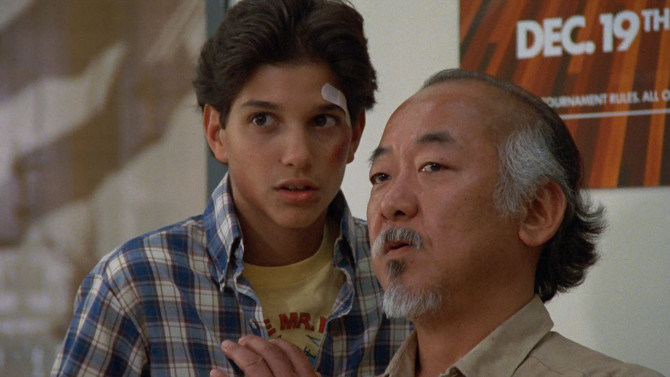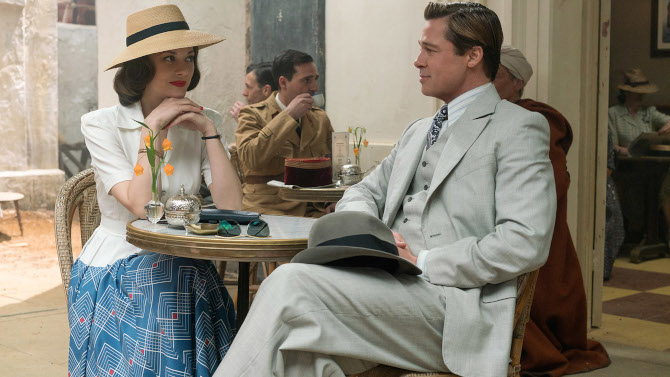
Déjà vu Dalliance
Channeling the mesmeric movies churned out by the studio system back in the 1930s and 40s, Allied (2016), directed by Robert Zemeckis, channels the likes of Morocco, Casablanca, Across the Pacific, Gilda, To Have and Have Not, and numerous others – attempting to find a spark from the classic themes of melodrama, romance, suspense and the epic nature of the annals of the cinematic past, with quite successful results. Set the year Casablanca and Across the Pacific were released – 1942, the story in fact starts in Morocco, with recently parachuted in Canadian spy Max Vatan (Brad Pitt) meeting up with another undercover agent, Marianne Beauséjour (Marion Cotillard), who will be pretending to be his wife.
-
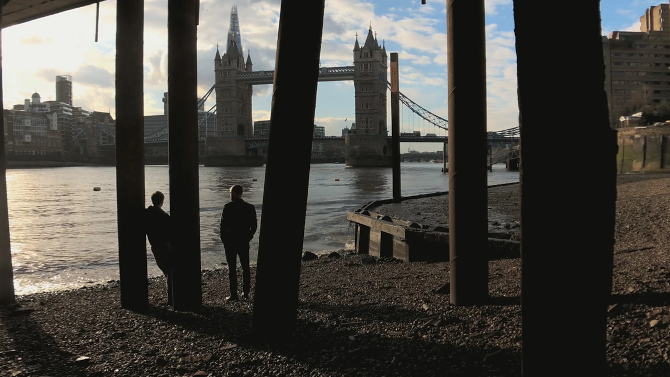
Cell Phone
GhostJuly 8, 2020An example of Indie, guerilla-style film making, Anthony Z. James writes, directs and produces his first feature film, 2020's Ghost (also known as Ex-Con); shooting on the mean streets of London, the production was simply shot with an Iphone (with an anamorphic lens) – something you will find increasingly hard to believe the longer you delve into this motion picture. Dropping us into an important day in the life of Tony Ward (Anthony Mark Streeter), the man is officially an ex-con – just released from prison. Following him in his first steps back in the real world (approximately seven minutes without a word of dialogue – somewhat bringing to mind Patrick Ryan’s sadly under-seen 2014 Irish Indie film Darkness on the Edge of Town), James places us in the man’s shoes, engrossing tracking shots reminiscent of Stanley Kubrick’s Paths of Glory – uprooted from the muddy trenches of World War I to the gritty side-streets of London, these techniques allowing his steps to become ours. Hoping that each stride is one into a more straight-laced and balanced future, the shadows of his past linger, shrouding the very day in a gloomy, melancholic uncertainty.
-
Star Pick with Bob Morley
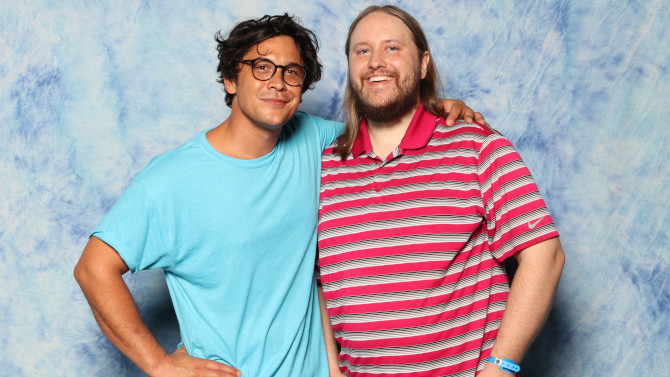 The Karate Kid Is Hot TonightThe Karate KidJune 13, 2020
The Karate Kid Is Hot TonightThe Karate KidJune 13, 2020If you are a fan of the television series The 100 - a post apocalyptic tale in which one hundred delinquent teens are sent to an uninhabitable Earth to allow those on a space station to survive (only for them to discover that the planet, that was ravaged by a nuclear war ninety-seven years earlier, is, in fact, alive and well), then this will be exciting for you. Over the next couple of months, in order to celebrate the show's seventh and final season (which started airing on May 22nd, 2020), I am happy to announce that there will be three Star Picks coming up in the near future with a triumvirate of stars from the extremely popular series. First up, the series' male lead - Bob Morley. An Australian actor who got his start on soap operas in his native country (his first big break coming when he was added to the main cast of Home and Away in 2006), just eight short years later and he's found his way to Vancouver, Canada to shoot The 100, taking on the role of Bellamy Blake (who would quickly become a fan favourite) - a riveting character that we have watched grow over the past seven seasons.
-
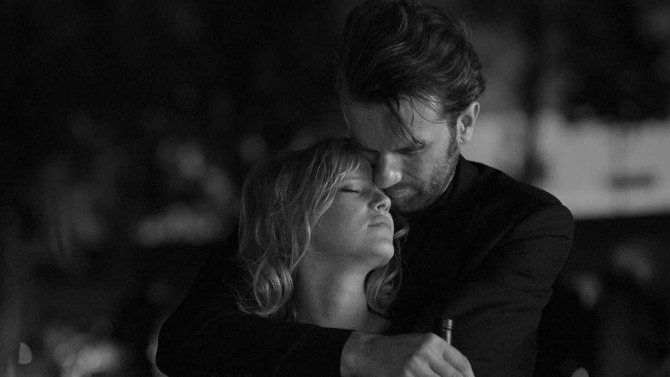
Some Like It Cold
Cold WarApril 26, 2020It is likely that any other year, outside of 2018, would have meant that a second one of Pawel Pawlikowski’s films would have won Best Foreign Language Film at the Academy Awards (the other is 2013's Ida). Instead, Alfonso Cuarón’s Roma (in its own right, a truly visionary film) froze out Cold War. Though this Polish export did achieve a nomination in the above mentioned category, as well as receive nods for Best Achievement in Directing and Best Achievement in Cinematography, it, in many ways, got overshadowed by another black and white foreign film released the exact same year. . . which is truly a shame. Set in post-war Poland – 1949, to be exact, Wiktor (Tomasz Kot), a very bourgeoisie musician (a dynamo who can play the piano, as well as write and arrange music) – bold, confident, and gifted, tours the countryside, recruiting the most talented teens and twenty somethings for a folk music ensemble that will tour Poland and the rest of the Eastern Bloc. One of the finds, Zula (Joanna Kulig), an undaunted singer, may not be the most pure talent, though she has that certain ‘je ne sais quoi’. With a mystifying persona, she is spark plug, femme fatale (both director and actress inspired by Lauren Bacall and her sarcastic delivery), and, somehow, ingénue. Wiktor has found his muse. . . love at first sight. . . the genesis of a change that you can never return from. A love affair blossoms.
-
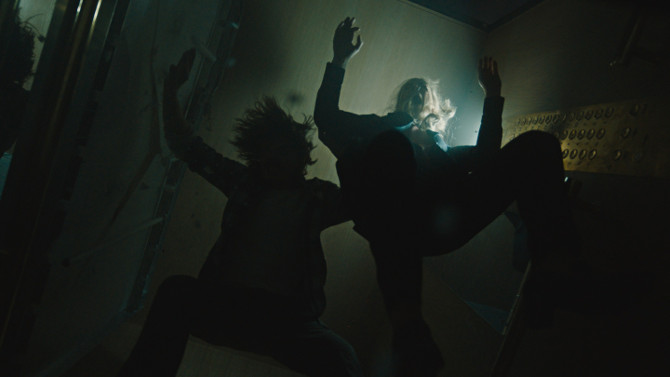
Shake `n Quake
The QuakeApril 14, 2020Norway is quickly becoming the master of the grounded disaster film. In 2015, The Wave received critical acclaim. . . three years later, the same creative team (including producer Are Heidenstorm and writers John Kåre Raake, Harald Rosenløw-Eeg) brought forth a sequel, The Quake, directed this time by John Andreas Andersen. If there was one complaint about the previous film, it is that there could have been a bit more depth in regard to the characters. Learning from their mistakes, The Quake takes place three years later. . . Kristian Eikjord (Kristoffer Joner) is deemed a hero by the country – though he does not feel one. Bogged down by the countless lives lost after the title wave hit the tourist town Geiranger, the now bearded man is in a fugue-like nervous state.
-
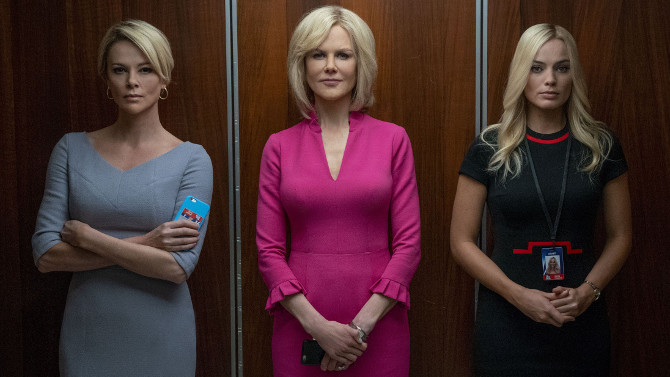
An Explosive Story
BombshellFebruary 4, 2020There are always a few films every year that seem to tap into the present zeitgeist (a window into prevailing spirit and mood of the time). . . one of 2019's is most definitely Bombshell, written by Charles Randolph (who won an Oscar for his Adapted Screenplay of The Big Short, along with Adam McKay), and directed by Jay Roach – who continues his seamless transition from comedy filmmaker to dramatic (this following his 2015 effort in Trumbo). Centred on three women working at Fox News in 2016, our quasi-narrator is Megyn Kelly (Charlize Theron in an Oscar nominated performance), who has just asked too liberal a question to Donald Trump at the 2016 Republican Debate (leading to backlash from its conservative viewership), newscaster Gretchen Carlson (Nicole Kidman), whose more liberal leaning slant has plateaued her career, and newbie Kayla Pospisil (Margot Robbie, also nominated for an Academy Award), who is trying to find an avenue that will get her on the air in some capacity. As you will probably recognize, Kelly and Carlson are real people, while the Pospisil character is an amalgam of many women (and not based on a specific real life person).
-
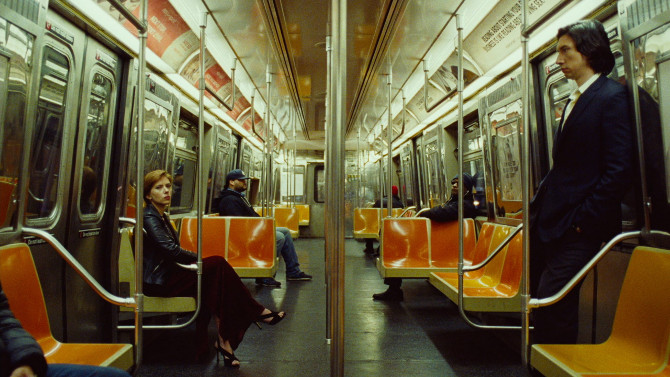
Go Your Own Way
Marriage StoryFebruary 2, 2020A guy walks into a bar; the bartender immediately recognizes that the patron is pissed off. Sliding the man a beer, he asks, “What’s ailing you?”, to which he replies, with a loud, booming voice, “ALL LAWYERS ARE ASSHOLES!!!”. There is only one other person in the establishment, someone sitting at the other end of the bar. . . his ears perking up, he immediately shouts, “I take offence to that.” Taken aback, the new patron asks, “Are you a lawyer?”, to which he concludes, “No, I’m an asshole”. All joking aside, lawyers, despite not being the main players in writer/director Noah Baumbach’s 2019 Academy Award Best Picture nominee Marriage Story, play an integral part in the piece. Following Charlie (Adam Driver) and Nicole (Scarlett Johansson), their so called marriage story is quickly becoming a separation and divorce story. Living in New York, Charlie is a renowned theatre company owner and playwright (by no means rich, but respected), his wife his actress muse. . . an edgy Hollywood teen actress that has transitioned to respected stage performer. With a young son, Henry (Azhy Robertson), their marriage has run its course. . . Nicole returning home to California (with their son) to film a pilot for a new series, Charlie must balance his hectic life, attempting to run his troupe while racking up frequent flyer miles to visit his son.

